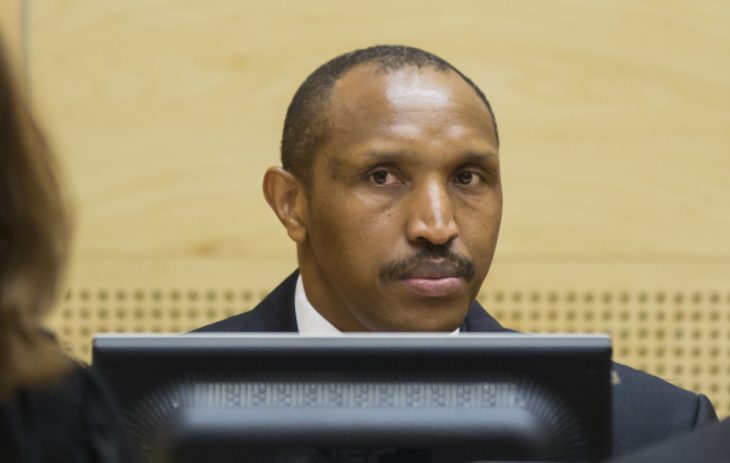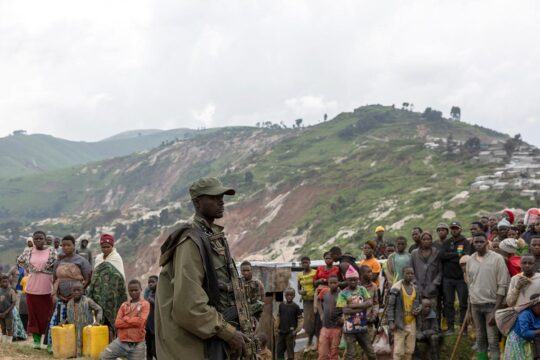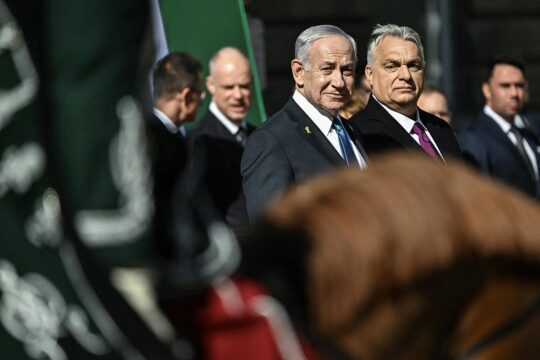Congolese rebel leader Bosco Ntaganda told his war crimes trial Thursday he was 'a soldier, not a criminal', breaking his silence for the first time since surrendering to the International Criminal Court.
"I have been described as 'The Terminator', an infamous killer, but that is not me," Ntaganda said on the second day of his trial before the Hague-based court.
"I am a soldier... I am not a criminal," the 41-year-old former rebel commander insisted, denying 18 charges of war crimes and crimes against humanity brought for his role in a deadly 2002-2003 conflict in the Democratic Republic of Congo.
With the trial being broadcast on local radio stations across the vast central African country, it is the first time his alleged victims have been able to hear the former rebel leader defend his actions.
"I am not the Bosco Ntaganda depicted by the prosecution yesterday (Wednesday)," Ntaganda said, speaking softly in his native Kinyarwanda through an interpreter.
"I never attacked civilians, on the other hand your honours, I have always protected them," added the tall rebel leader, dressed in a black suit, white shirt and striped blue tie.
- 'Cut to pieces' -
Ntaganda has pleaded not guilty, but lawyers representing victims opened Thursday's hearing with harrowing details of horrific abuses allegedly unleashed by his rebel forces.
Lawyer Dmytro Suprun told how one woman tried to crawl away from an attack.
"They (the soldiers) caught up with her and cut her and her baby to pieces" with machetes, he said.
On Wednesday's first day of what is expected to be a lengthy and complex trial, prosecutors showed judges grisly images of bodies littering a banana plantation as they accused the former rebel leader of terrorising the northeastern Ituri region.
The corpses were dumped after being indiscriminately slaughtered, allegedly by Ntaganda's rebel Patriotic Forces for the Liberation of Congo (FPLC), the armed wing of the Union of Congolese Patriots (UPC) party in Ituri.
Ntaganda has been charged with ordering hundreds of deaths in savage ethnic attacks, as well as with the recruitment and rape of child soldiers within his own rebel army.
The trial was adjourned Thursday until September 15 when the first witnesses are due to give evidence.
Some 70 victims and about 13 experts are due to be called to the stand.
"Bosco Ntaganda was one of the highest commanders... he gave the orders to attack and kill," ICC chief prosecutor Fatou Bensouda told the three-judge bench on Wednesday.
Lawyer Stephane Bourgon however had told the judges Ntaganda's defence would present a "completely different picture" as many of the accusations arose from legitimate military activities.
- Feared rebel commander -
Standing up in the dock Thursday, Ntaganda spoke for the first time at length since giving up a life on the run and walking into the US embassy in Kigali in March 2013.
The motives behind his surrender still remain unclear, but some experts have speculated that he feared for his life after a schism among the rebels.
Eastern DR Congo has been mired for two decades in ethnically-charged wars, as rebels battle for control of its rich mineral resources.
The unrest spiralled to encompass armies from at least six African nations, claiming an estimated three million lives in one of the world's most deadly recent conflicts.
Despite protesting his innocence, prosecutors say the feared rebel commander played a central role in the Ituri conflict which rights groups believe alone left some 60,000 dead since 1999.
Known for his pencil moustaches, cowboy hats and love of fine dining, Ntaganda faces 13 counts of war crimes and five of crimes against humanity.
The court had issued two arrest warrants against Ntaganda -- the first in 2006 and the second with additional charges in 2012 for crimes committed in Ituri.
His former FPLC commander Thomas Lubanga was sentenced to 14 years in jail in 2012 on charges of using child soldiers, one of only two convictions handed down by the court since it was set up 12 years ago.






